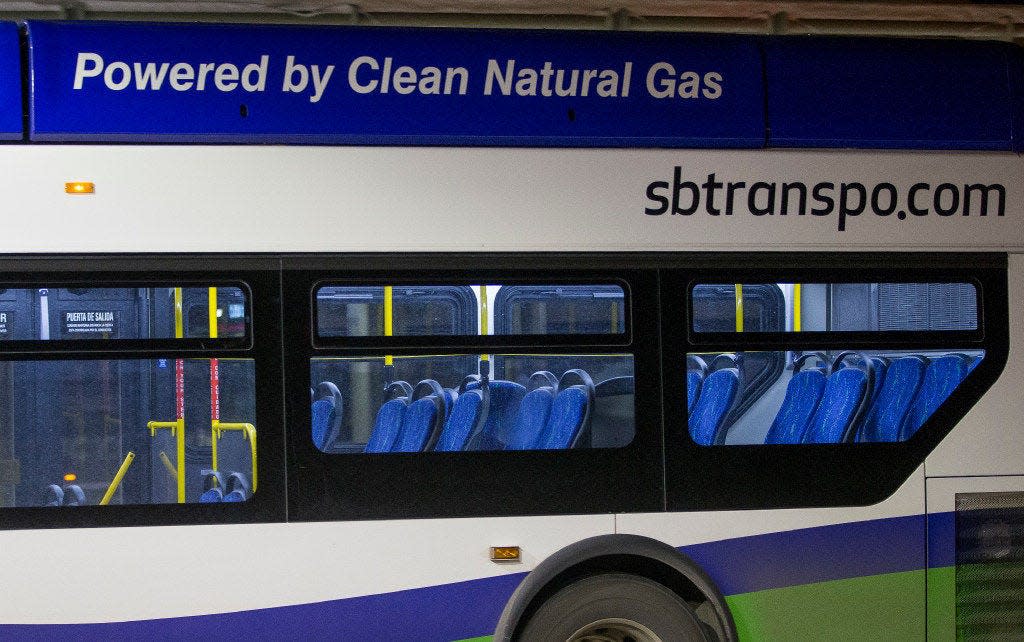South Bend renews program to provide free Transpo and Uber rides to nonprofit clients

SOUTH BEND — Starting this June, the city will provide up to 10 St. Joseph County nonprofits with free Uber and bus rides to help their clients who lack transportation.
Grant money for the first two years of South Bend's Community Nonprofit Partner Program ran out last fall. But the city has allotted $70,000 to run the initiative for another year, from June 3 through May 2025, and applications open this month.
The program will allow up to 10 county nonprofits to provide each of their clients with eight free Uber rides a month and an unlimited monthly Transpo bus pass. Both benefits would last up to a year.
Public transportation: Michiana transit weighs conflicting goals of ride frequency, geographical coverage
The free rides help to fill a gap in transportation access that can prevent residents from getting to work, medical appointments or the grocery store, said Madi Rogers, South Bend's director of civic innovation. The support for nonprofits is one element of the larger Commuters Trust program, a public-private partnership between South Bend and 16 or so area employers to provide free rides to work.
“The residents and clients of these nonprofits may be people who are already disadvantaged in other areas of their lives," Rogers said. "Transportation to the appointments they may be setting up with these nonprofits is critical."

John Pinter, the executive director of the United Religious Community of St. Joseph County, leads a nonprofit that assists refugees to South Bend and provides low-income folks with financial help in emergencies.
His nonprofit's clients have benefited from the free transportation over the last few years, when families or individual refugees have arrived from Latin America, the Middle East and Ukraine without cars or much money. Especially during a crucial few months after their arrival, Pinter said, convenient rides allow people to start new jobs, attend English training courses and shop at local stores.
"The biggest challenge that we run into is, as people do get employed, the employment is not always convenient to where they could walk to work or bike to work," Pinter said. "So the challenge is how to create a sustainable way that people can get to and from their employment."
Immigration: South Bend's new 'Welcoming Plan' aims to foster belonging in growing immigrant population
Refugees are often coming from embattled regions, Pinter said. He said a few dozen people arrived from Afghanistan in late 2021 after the Taliban seized control of the country's capital city, Kabul. Many of the nonprofit's current clients escaped political and economic crises in Venezuela, Cuba and Nicaragua.
Pinter expects many more refugees to arrive from Ukraine in the coming months, as Russia's war on its western neighbor rages on more than two years later. He said his nonprofit will apply and hopes to be selected as one of up to 10 award recipients.
During its last two-year iteration, funded with a $100,000 grant from United Way of St. Joseph County, the Community Nonprofit Partner Program supported 229 participants with more than 46,000 rides on Transpo buses or with Uber drivers, city data shows.
The overarching Commuters Trust program, which includes employers like the University of Notre Dame and Goodwill, started in 2019 with a $1 million grant from Bloomberg Philanthropies. The separate initiative to get employees to work has resulted in nearly 80,000 Transpo rides and about 18,000 Uber and Lyft rides, Rogers said.
After that Bloomberg money ran out, this year is the first that South Bend is funding the Commuters Trust program on its own, Rogers said. Earlier this year, the South Bend Redevelopment Commission agreed to allot $200,000 to the initiative in 2024. Each participating employer pays its own share of costs, unlike in the nonprofit program.
Both programs "really indicate the need for additional and versatile transportation options for clients and residents and employees of St. Joseph County," Rogers said.
How nonprofits can apply to city program offering free rides
The city will host a webinar at 2 p.m. on April 10 to prepare interested nonprofits to apply for the Community Nonprofit Partner Program. Organizations can register to attend by going to https://bit.ly/cnpp24.
The application period will open on Friday, April 12, and close on Monday, May 6. The program runs from June 3, 2024, through May 31, 2025.
To be eligible, organizations must meet the following criteria:
Be registered as a 501(c)(3) not-for-profit organization
Have a business location within St. Joseph County
Directly serve clients that live or work in St. Joseph County
Provide services to clients who face transportation insecurity that prevents them from accessing food, health care, work, education or child care
Upon acceptance, agree to support participant referral and enrollment and data collection efforts
For more information and to apply, visit the program website at www.commuterstrust.com/cnpp24 or email info@commuterstrust.com.
Email South Bend Tribune city reporter Jordan Smith at JTsmith@gannett.com. Follow him on X: @jordantsmith09
This article originally appeared on South Bend Tribune: St. Joseph County nonprofits offer transportation help
